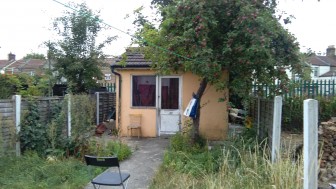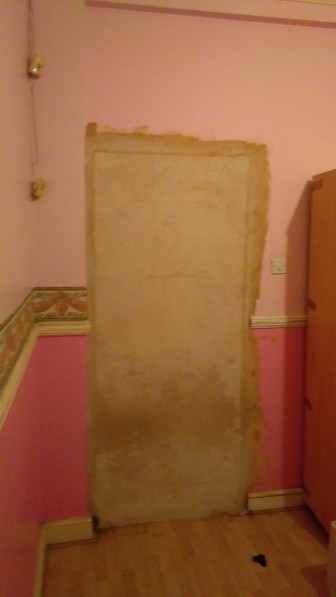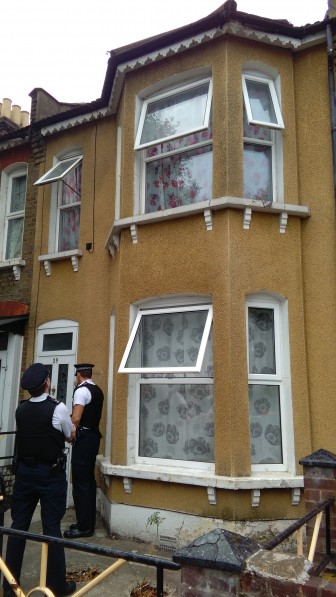This week I joined Newham council’s taskforce to experience at first hand just part of the massive housing crisis which is engulfing certain corners of Britain, and pockets of the capital in particular. I was horrified by what I was to see.
We have all heard the tales of 20-plus people living in one small terrace house, but to see it with my own eyes this week made it all the more shocking.
Getting back on the Tube at East Ham for the journey home to the safety of my two-bed Islington flat, rented off a perfectly scrupulous housing trust, I felt extremely lucky and a deep sense of sadness that people just a few miles away were living in such cramped, filthy conditions.
And not only do they live in these conditions, but many appear to accept them as their fate.
Most of Newham’s private landlords are, like the vast majority across the country, law-abiding landlords who take care of their properties and their tenants.
But others – in some cases, helped by letting agents – are also exploiting their tenants, cramming vast numbers under one roof to pocket as much cash as they possibly can, with not a care in the world for the people who are left to pick up the pieces.
Many things about the properties I saw on Tuesday morning while accompanying Newham council’s private rented sector licensing team on one of their twice-weekly early-morning door-knocking operations, were completely normal.
There were children’s scooters, linen spinning in washing machines, crockery draining by kitchen sinks, and the remains of breakfast left over after hurried occupants had departed for the morning commute.
Other things I saw, however, were horrific. Light fittings hanging dangerously off walls, broken smoke alarms left unmended, and electric wires trailing hazardously from room to room.
And then of course there was the blatant evidence of the sheer volume of people living in these homes. Slum is a strong word, but some of these homes came as close to fitting its definition as a closeted Londoner may ever get.
There were connecting doors unashamedly filled in and left undecorated to create extra bedrooms, a shed with a fastened lock – quite possibly by an occupant who, before we arrived, had left for the day.
And then there were the beds. Lots and lots of beds – as many as eight of them in one room in one house which appeared to be home to more than 20 people.


The officers from Newham’s licensing team are the crusaders taking the fight to the London borough’s rogue landlords – helping out those who do obey the rules along the way.
The team consists of senior Newham council officers, immigration enforcement officers and the police – agencies which work together to crack down on landlords who have either failed to license their property or are not adhering to the licence’s terms and conditions.
Every private landlord in Newham is required to be part of the council’s licensing scheme. The authority uses a data system which gathers information from various parts of the council and its partners to assist it in identifying houses that may be in multiple occupation. This information includes council tax, benefits, planning, waste, enforcement and residents’ complaints.
Universal licensing in Newham, say the team, has almost been cracked, but what lies ahead is the challenge of bringing to justice the borough’s many HMO landlords who continue to break the terms of their licences.
After arriving at the swanky Newham council offices – a stone’s throw from London City airport – at 7am on Tuesday, I was whisked off to the first of three East Ham properties. This one, like all those we would see that morning, was a typical street property which, before it was so crudely adapted, would have been described as a three-bedroom mid-terrace house.
The landlord of this particular property had failed to license it, but it was clear it was being let out. The one tenant present at the time told us there were seven people living at this house, but two rooms were locked, as was the shed at the back of the garden, so it was quite possible more could have been staying there.
The fire hazards were stark: damaged smoke detectors, loose light fittings and a lack of a fire door to the kitchen. There were also mouse droppings and damp and mould.
Shortly after 8am we arrived at our second property – where the sickening reality began to dawn on me.
The landlord of this cramped home was registered as holding a selective licence, which means just one family was meant to be living there. In fact we found 20 beds – all of which seemed to be in use, and the occupants were unrelated. Of the 20 beds, eight were ruthlessly bunked up on top of each other in one room – a number Russell Moffatt, Newham council’s private housing manager, described as something of a record.
Moffatt told me: “One tenant here said they were paying £60 a week to rent. There’s 20 people here. That adds up to a lot of money. The landlords do not have to work, so you can see why they do it.
“If this was being let to a family, they would be paying around £1,500 (a month). This way it is double your money (for the landlord).”
The 20 people who lived here shared a single bathroom.
At this property it was clear that one woman was in charge of all the other tenants. Moffatt said landlords often appointed a head tenant, to whom they paid a nominal fee for collecting the rent. The head tenant, said Moffatt, also often provided rogue landlords with someone to blame if they were later taken to court.

Newham was the first London borough to introduce borough-wide private rented sector licensing in January 2013. It now has 35,501 properties that have been issued with a licence. It has carried out 611 prosecutions of 492 landlords since the introduction of the system for failure to licence, providing poor quality housing and failing to comply with licence conditions. As a result it has also banned 25 landlords from operating in Newham.
Between 2011 and 2014 Newham council undertook 359 housing prosecutions. The next closest was Haringey with 57.
Moffatt said: “The database takes details of gas safety certificates, electricity certificates, tenancy agreements, bond certificates, references, the schedule of inspection and pest control.”
He explained how a picture of what was going on at a property could often be presented by the database after all the information has been fed in, and said it was the 25-30% of landlords who did not supply the paperwork when requested that went on to the list to be paid a visit.
At our third property there were four fridges in the one kitchen – again, clear evidence of severe overcrowding. This landlord was in breach of his selective licence.
And at the fourth property, which was also registered under a selective licence for eight family members, we were told by a tenant that in fact ten unrelated people lived there. A potentially dangerous gas leak was also discovered and quickly fixed.
During the visits the team took statements from the tenants who were at home, and will now decide whether they have enough evidence to pursue a prosecution against each landlord. If they decide they do, they will begin to build cases against those landlords for various offences, including failure to license a property and breach of licence.
There were also three arrests made, two for immigration offences and one for breach of treaty rights – or failure to find work.
Speaking on Tuesday morning, the Mayor of Newham, Sir Robin Wales, said: “It will take time, but in the end London will get rid of this sort of abuse.
“We should be tackling housing and wages. We cannot allow people to live like this, we cannot allow neighbours to have people living like this. If you look at the bins they are full – there is a lot more anti-social behaviour.
“When you have that number of people living in one place, often young men, they will be drinking and causing all sorts of problems.
“Another thing we are campaigning for, with the GMB, is to enforce the minimum wage, because if these people got paid a decent wage they might be able to live in better conditions, so our argument is that there is a whole bunch of stuff going on in our society that is not acceptable in a civilised place. We are tackling that and are very proud of it.”
Asked when he believed he would be able to see an end to the problem, Sir Robin said: “When we are in a position where this sort of abuse is uncommon, when people behave properly – that’s where we want to get to.
“It’s going to take a while. We have made a start, there are lots of people being challenged. We want to help the good landlords so that they are able to rent the places out. People behaving properly – that’s where we would like to get to.”
Newham council has made a start – a very good start, but there is still one hell of a long way to go in tackling the rogue landlords here.
As one police officer told me: “If you threw a stick at this street, the chances are you would find many, many more HMOs.”
Eye was asked not to identify the streets in which the properties were located ahead of possible prosecutions.



Great piece. More of this please.
You must be logged in to like or dislike this comments.
Click to login
Don't have an account? Click here to register
A sobering reality check on some of the worst housing conditions in London in 2015. A great piece by Charlie that gives us all food for thought. With today marking for deadline for email responses to Govt consultation on tackling rogue landlords and agents, what better way to demonstrate this issue needs to be addressed and can’t be allowed to continue.
You must be logged in to like or dislike this comments.
Click to login
Don't have an account? Click here to register
As a newcomer to the property industry, and not having the passionate beliefs overtime we all get, What is your take on “private rented sector licensing”? – It would be interesting to hear the opinion of somebody not with a vested interest or having been swayed one way or another.
You must be logged in to like or dislike this comments.
Click to login
Don't have an account? Click here to register
In response to ‘smile please’, I think Newham have demonstrated how property licensing can be used as an effective tool to tackle the worst housing conditions. They have developed what is probably the best resourced housing enforcement team in the country and their joint working with other agencies sets a benchmark for other councils to follow. But that doesn’t mean licensing is the right choice for every area. Having an effective strategy for the private rented sector is never that simple.
You must be logged in to like or dislike this comments.
Click to login
Don't have an account? Click here to register
It is taxation. If it was not taxation you would have one license for each landlord countrywide. As with driving – you have a license to drive but tax each car you may have.
You must be logged in to like or dislike this comments.
Click to login
Don't have an account? Click here to register
It is naive of us to think that this is not replicated around the country; perhaps not on quite the scale as Newham, but More evidence of a chronic housing shortage…… the DCLG consultation paper proposes a number of hammers to crack various nuts, but surely the legislative framework already exists? Interim Management Orders are seldom used because local authorities do not have the money to implement the necessary remedial works. If the courts were prepared to go after “proceeds of crime” monies that could be put into a ring fenced fund which LAs could apply to…….
You must be logged in to like or dislike this comments.
Click to login
Don't have an account? Click here to register
It now has 35,501 properties that have been issued with a licence. It has carried out 611 prosecutions of 492 landlords since the introduction of the system for failure to licence, providing poor quality housing and failing to comply with licence conditions.
Great article and some good work being done by Newham Council. HOWEVER, £35,000 property licences against less than 500 prosecutions is a hell of a lot of good landlords filling out lengthy forms and paying whatever the fee is….. and all because of a few bad landlords. It’s hardly fair, is it.
You must be logged in to like or dislike this comments.
Click to login
Don't have an account? Click here to register
MF you make a very good point. These types of landlords do not have the support of good landlords. The author Charlie Strong makes the point that the vast majority of landlords are good landlords but all landlords get tarrred with the same brush as these scum landlords. The result is that the good guys are paying for the bad landlords who exploit the situation. Newham has a large proportion of poor housing stock unlike Croydon which has some good quality areas. I regard Croydon as a rogue council as not all their borough is deprived – so it is money generation (in my opinion) with Croydon.
I don’t know how much a license costs in Newham but at say £500 per property will generate £17.75 million pounds. They seem to have prosecuted 611 landlords in 5 years. That is about 120 per year. This means each prosecution has cost £29,000 EACH. Is this really good value? I readily accept they need to take action but the source of finding bad landlords comes from Council Tax, Benefits, Planning, Waste enforcement and complaints – not licenses. Given the penalties for bad landlords it should pay for itself with fines for successful prosecutions.
Why should it always be the Good Landlords who pay for this?
Most councils have areas of affluent housing so why they feel they can justify borough wide licensing is beyond understanding. The only reason is to raise money by TAXING landlords. Such costs of course are passed onto tenants one way or another. If Government want to drive away investment and reduce the number of letting units they are going the right way about it – of course rents will rise as excess demand rises even further.
It is increasing the housing supply or reducing demand that will solve the problems. If there were adequate supply these bad landlords would not have the tenants to prey on. Of course no one wants to acknowlegde the inadequate supply because they don’t have funding to resolve it so it all gets blames on the so called Rogue Landlords and in the public mind this terminology has come to mean all landlords are rogues. The term rogue landlord should be dropped. So often the press focus on the the horror stories and fail to admit the vast majority of landlords are good. Using the figures in this article 0.0139% of landlords have been proven to be rogue landlords which suggests 99.986 landlords are NOT.
Please note I DO NOT CONDONE IN ANY WAY the horrific findings in Charlie Strongs report but please don’t forget good landlords get adverse press in the minds of the public reading such articles.
You must be logged in to like or dislike this comments.
Click to login
Don't have an account? Click here to register
Very good post, Will. Very good points.
You must be logged in to like or dislike this comments.
Click to login
Don't have an account? Click here to register